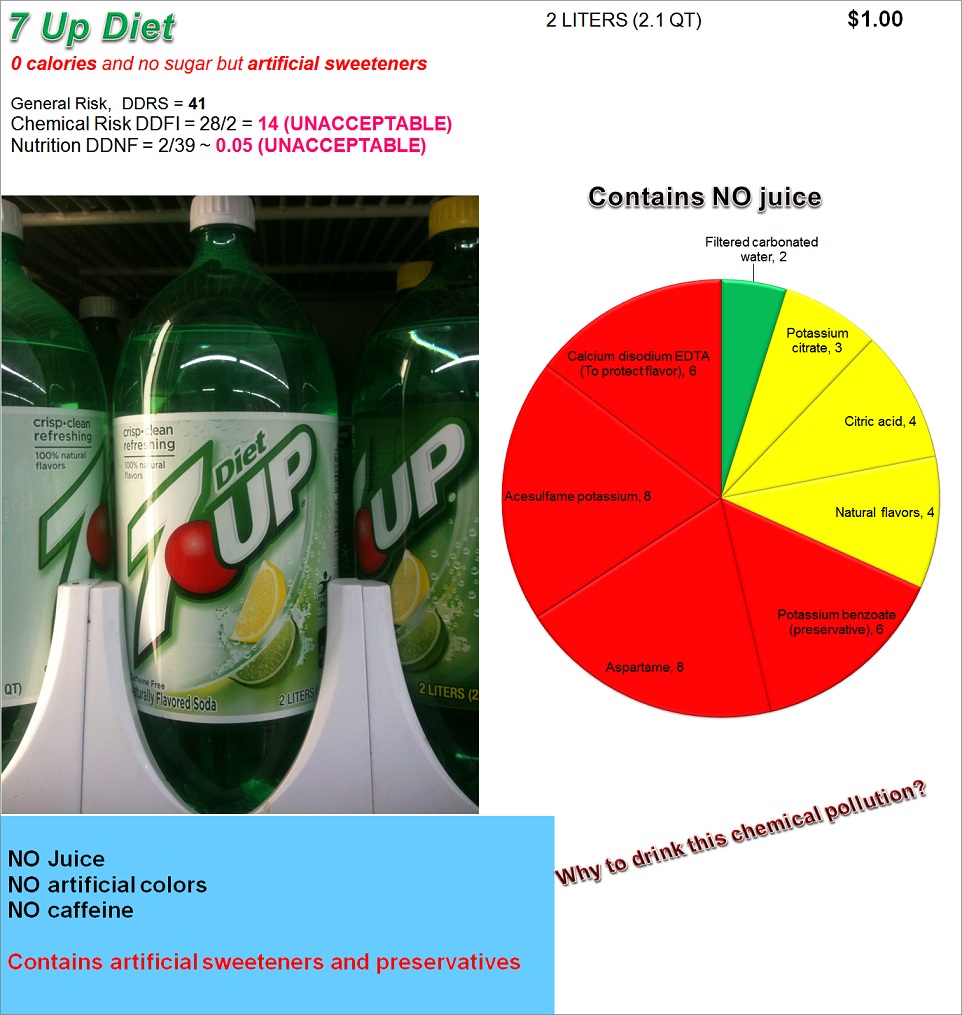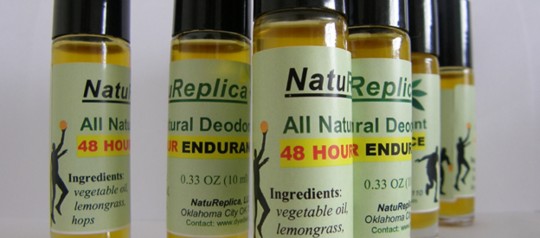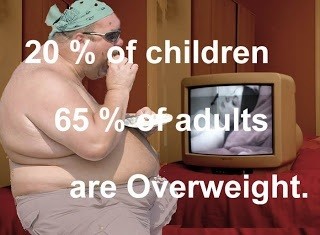7 Up Diet soda: Chemicals on top of chemicals
Here is a piece of history from Wikipedia which helps to understand how the drink has been transformed from its original lemon-lime soda to its modern chemical concoction. 7 Up has been reformulated several times since its launch in 1929. In 2006, the version of the product sold in the U.S. was reformulated so that it could be marketed as being “100% Natural”. With this aim the chelating-agent calcium disodium EDTA was eliminated and sodium citrate was replaced with potassium citrate to reduce the beverage’s sodium content. This new version contains no fruit juice and is sweetened with high-fructose corn syrup (HFCS). In 2007, after the Center for Science in the Public Interest threatened to sue 7 Up, it was announced that 7 Up would stop being marketed as “100% natural”. Instead, it is now promoted as having “100% Natural Flavors”. In 7 Up Diet Soda lemon and lime flavors are the only two chemicals they can claim “natural.” Maybe so but don’t be fooled: The flavors are synthesized in a lab.
DyeDiet Doesn’t Buy It!
 7 Up Diet Soda: Risk and Nutrition
7 Up Diet Soda: Risk and Nutrition
Diet versions of drinks are designed to deliver sweetness you want without calories and damaging impact of too much sugar you don’t want. The net result is zero calorie in a bottle and more strange chemical agents in your blood and brain. Everyone knows that too much alcohol is health damaging but do not assume that regular drinking of diet and zero beverages is not. You cannot trick living nature for too long: Artificial sweeteners no silver bullet for losing weight. Also read: A Role for Sweet Taste Calorie Predictive Relations in Energy Regulation and Health Effects of Drinking Sodas.
Food additives to avoid:
- Aspartame, is an artificial sweetener with highly controversial history.
- Acesulfame potassium, is another artificial sweetener added to mitigate unnatural aftertaste of aspartame. Health effects of acesulfame potassium are lacking thorough long-term studies.
- Potassium benzoate is a preservative which, as well as sodium benzoate, is known to produce benzene, a known carcinogen in presence of acids, such as ascorbic acid (vitamin C) or citric acid
- Calcium disodium EDTA is an agent (chelating) highly capable of binding metal ions. It is added to soft drinks containing sodium or potassium benzoate to reduce formation of carcinogenic benzene. While its (EDTA) acute toxicity was found low with LD50 (rat) of 2.0 – 2.2 g/kg, it has been found to be both cytotoxic and weakly genotoxic in laboratory animals. Oral exposures did cause reproductive and developmental effects.
Note, what they do: They add a chemical then they add another chemical to lower side-effects of the first one. Tell me, what kind of loving parents would willingly expose their children to even 1/10 of the above listed risks? The question is: Why to take these needless risks in the first place when they are so easy to avoid by simply not choosing 7 Up Diet Soda (and the similar products)?
7 Up Diet Soda gives you RECORD high chemical risk of DDFI = 28/2 = 14 and essentially ZERO nutritional compensation: DDNF = 2/39 ~ 0.05. Why to drink this chemical pollution?
Bottom line. 7 Up Diet soda is more like a product of chemical industry which is as bad as Zero Coke. This chemical waste contains no lime or lemon or anything else that could be useful for human consumption. A couple of synthetic (natural) flavor chemicals do not offer anything to consumers but only allow the manufacturer to trick them with “100% Natural Flavors” claim on the label. Better alternatives would be low sugar Sparkling Concord Grape of Chadwick Bay’s and pure plain or mineral water. Have a Healthy Merry Christmas!
Category: Diet drinks, Food Terrorism, Soft drinks, Zero calories







So it is like chemicals on top of chemicals on top of chemicals. It is chemical-normous drink.
Yes, you are right. In my opinion, 7 Up Diet soda like so many other similar drinks in the market is unacceptable for consumption by human beings. Maybe it would be good for xenomorphs (http://en.wikipedia.org/wiki/Alien_%28creature_in_Alien_franchise%29 )? I can foresee a question: Why is this happening? From one side, I can see TWO major reasons: 1) Ignorance and 2) Carelessness of millions of customers in America. From the other side: High profits of the manufacturers who produce such cheap chemical swill labeled with nice pictures of fresh fruits and who spend BILLIONS only to keep the customers brain-washed. But they cannot trick a professional chemist like myself. I personally consider this nasty situation as humiliating and disgraceful slavery of 21st century: Ignorant slaves bring their own money to big corporations to slowly destroy their own and their children’s health.
I am making parody of this video:
http://www.youtube.com/watch?v=uTN-BwMrxZc
It will be called “Wake Up With The Chemicals”. It will hopefully get people to stop buying chemically contaminated soda.
Ha-ha-ha! This will be just super! Go ahead, and even if the fruits of your efforts will be eventually rewarded by a few woken up, it’s worth doing so! We need to stop this masked slavery. Thank you!
Oh, by the way, when you are ready – you are very welcome to place your parody on the DyeDiet, just let me know.
Thousands of readers will watch it!
Did you know that too much sugar makes you sick & stupid?
My Aunt has pretty much drank only Diet 7up for several years…not even water really. She buys the diet 7up by the dozens, cases…and always has one with her. In the last year or so, something is tanking with her handwriting. It is so small and scribbly. She can’t really even write checks, sign a card, etc. It looks like a 90-year-old has written it. I am really suspecting the sweeteners in her Diet 7up.. Squiggly handwriting is a symptom of parkinson’s. Parkinson’s is caused by a loss of dopamine, according to the article in Sept 2015 Reader’s Digest.
Couldn’t these chemicals and sweeteners deplete, alter, or destroy dopamine somehow?
Incidentally, Grandma drinks Diet Pepsi (lives with my Aunt and is 90 and on dialysis). Such hard heads…it runs jn our family!
Thank for sharing your story. It may help others to avoid critical mistakes.